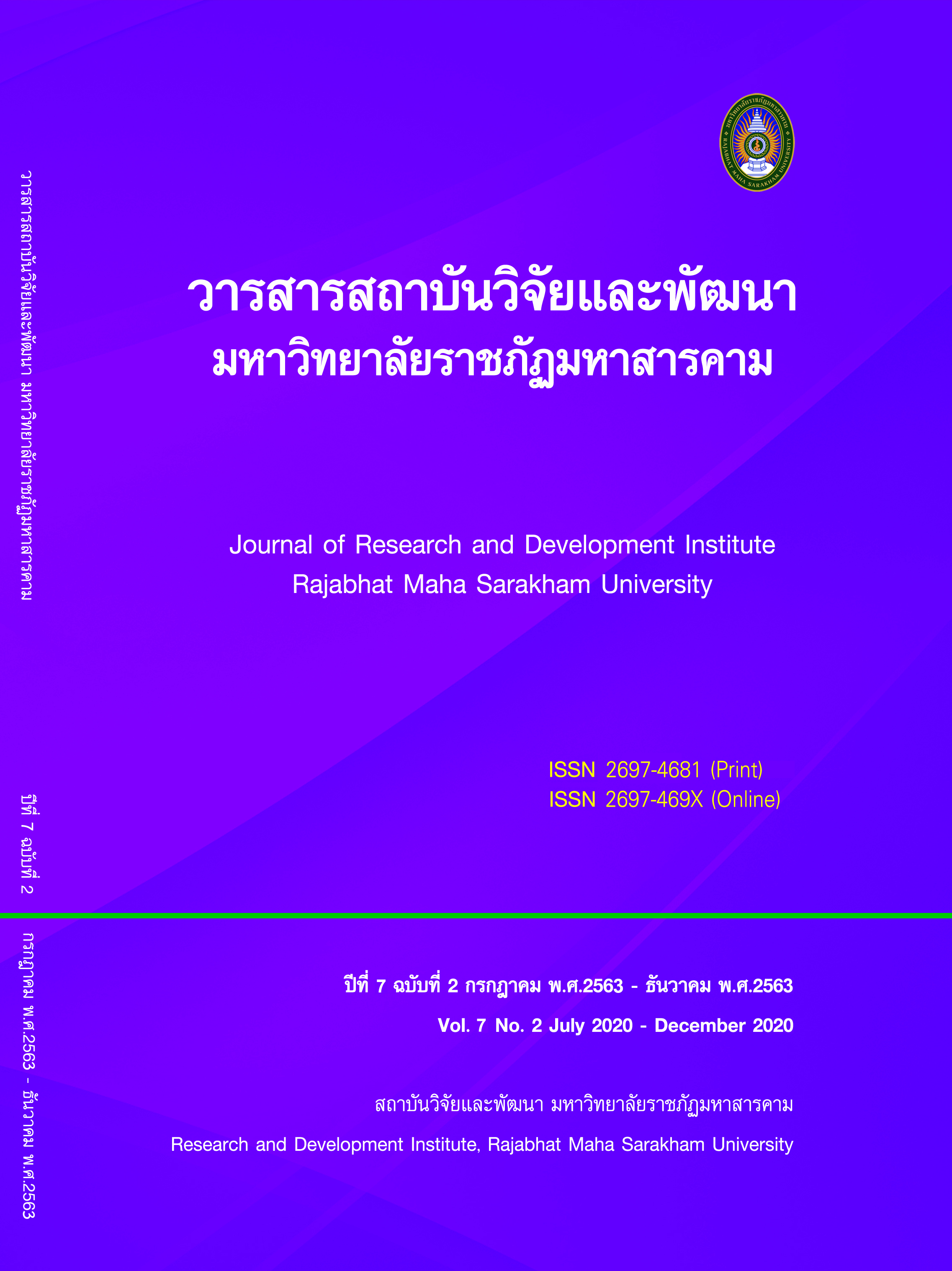THE CAUSAL FACTORS AFFECTING SUPPLY CHAIN MANAGEMENT AND BUSINESS PERFORMANCE OF SMALL AND MEDIUM ENTERPRISES UNDER THE TRANSPORT SERVICE SECTOR IN THAILAND
Keywords:
supply chain management, business performance, service sector TransportAbstract
This research aimed to (1) study causal factors affecting supply chain management and business performance of small and medium enterprises under the transport service sector in Thailand, (2) to verify the consistency between a model and empirical data. The sample consisted of business entrepreneurs of small and medium enterprises under the transport service sector in Thailand. Stratified sampling technique was used to select the sample. A questionnaire was used to collect data from 360 respondents. Study results indicated that (1) causal factors comprised 3 major components as customers were at the center (customer-centric approach), which there were 3 subcomponents, i.e. participation with customers, response to individual demand, and customer experience Digital technology had 4 subcomponents which included ability of technology acquisition, ability to use technology, ability to adapt technology, ability to create technological innovation. Business network had 3 subcomponents as business alliance, trade partner, joint venture. Supply chain management had 6 subcomponents as operation planning, operation support, raw material sourcing, production, transportation, return policy. Business performance had 2 subcomponents as financial and non-financial performance, (2) the verification of consistency between the model and the empirical data indicated that the model was consistent with the empirical data based on the consideration of goodness of fit index, i.e. Chi-Square/df, CFI, GFI, AGFI, RMSEA, SRMR , and Largest Standardized Residual which could pass all the determined value.
References
References
Al Sawalqa, F. A. H. (2011). The changing role of management accounting: assessment of the impact of financial and non-financial performance measures usage on organizational performance in Jordan. Doctoral dissertation, Murdoch University.
Amit, R., & Schoemaker, P. J. (2012). “Z strategic assets and organizational rent”. Strategische Management theories, 14, 325.
Boissevain and Mitchell. (1973). “Approach and avoidance motivation and achievement goals”. Educational Psychologist, 34, 149-169.
DuBrin, A.J. & Ireland, R.D. (1993). Management and organization. 2nd edition. Cincinnati, OH: South-West
Fader, P. (2011). Customer centricity: Focus on the right customers for strategic advantage. Philadelphia: Wharton Digital Press.
Federation of Thai Industries. (2016). The Federation of Thai Industries. [Online] www.fti.or.th. [15 August 2016]
Hanna, N. K. (2016). “E-commerce as a techno-managerial innovation ecosystem: Policy implications”. Journal of Innovation Management, 4(1): 4-10.
Junphen Wannarak. (2017). The Competitive Advantage Model of Transport Business and Logistics in Thailand. Doctorate of Business Administration Thesis: Sripatum University.
Kriengsak Chareonwongsak. (2016). Transport and logistics trends after AEC. [Online] http://www.kriengsak.com/Trends%20in%20transport%20and%20Logistics%20after%20AEC [5 Ausust 2016].
Krirkkla Sonthimas. (2014). The role of logistics in the development of special economic zones. Lecture of the Thai Logistics Federation. November 6, 2014, at Grand Ballroom, Golden Tulip Sovereign Hotel, Bangkok.
Lamberti, L. (2013). “Customer centricity: The construct and the operational antecedents”. Journal of Strategic Marketing, 21 (7): 588–612.
Laura Macchiona. (2017). “Supply chain configurations: a model to evaluate performance in customized productions”. International Journal of Production Research, 2017, 55 (5): 1386–1399.
Mishra, V., & Bisht, S. S. (2013). “Mobile banking in a developing economy: A customer-centric model for policy formulation”. Telecommunications Policy, 37 (6-7): 503-514.
Mithas, S., Tafti, A., and Mitchell, W. (2013). “How a Firm’s Competitive Environment and Digital Strategic Posture Influence Digital Business Strategy”. MIS Quarterly, 37 (2): 511-536.
O'donnell, A.. (2014). “The contribution of networking to small firm marketing”. Journal of Small Business Management, 52(1), 164-187.
Office of Small and Medium Enterprises Promotion. (2018). SME situation report 2018. [Online] https://www.sme.go.th/th/download.php?modulekey=215 [11 April 2019]
Office of Small and Medium Enterprises Promotion. (2019). Yearly report on the situation of small and medium enterprises 2019: Office of Small and Medium Enterprises Promotion. Bangkok: Office of Small and Medium Enterprises Promotion.
Patcharee Suwansri and Supattanee Piamsuwannakit. (2019). Global Community. [Online] https://www.baanjomyut.com/library/global_community/03.html [2 January 2019]
Sheth, J. N., Sisodia, R. S., & Sharma, A. (2000). “The antecedents and consequences of customer-centric marketing”. Journal of the Academy of Marketing Science, 28 (1): 55-66.
Stephen. (2001). “Supply Chain Operations Reference Model Version 5.0: A New Tool to Improve Supply Chain Efficiency and Achieve Best Practice”, Information Systems Frontiers, 3 (4): December 2001
Supamas Angsuchote, Somthawin Wichitwanna and Rachaneegool Pinyopanuwat. (2011). Analytical Statistics for Social Science and Behavioral Science Research: Techniques for Using LISREL Program. 3rd printing, Bangkok: Charoen Dee Mankhong Printing.
TDRI. (1989). The Development of Thailand’s Technological Capability in Industry. Volume1 Overview and Recommendations, Bangkok Thailand.
Wang, T., & Cullinane, K. (2015). “The efficiency of European container terminals and implications for supply chain management”. In Port management (pp. 253-272). Palgrave Macmillan, London.
Wasit Prombutr. (2011). CHARACTERISTICS OF LEARNING ORGANIZATION AND ITS IMPACT ON SERVICE QUALITY OF HOSPITALS IN THAILAND. Doctorate of Business Administration: Dhurakij Pundit University.
Watchara Vetchprasid. (2014). Human Resource Management Strategies Model Affecting Engagement and Performance of Hotel Employees in Thailand. Doctor of Business Administration: Ramkhamhaeng University.
Downloads
Published
How to Cite
Issue
Section
License
Articles that are published are copyrighted by the authors of the articles







